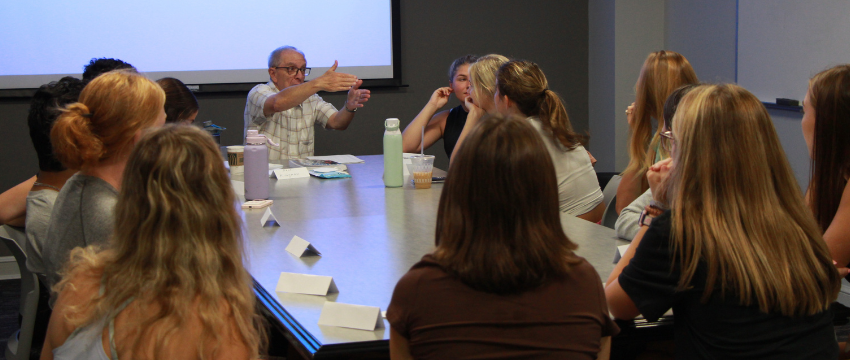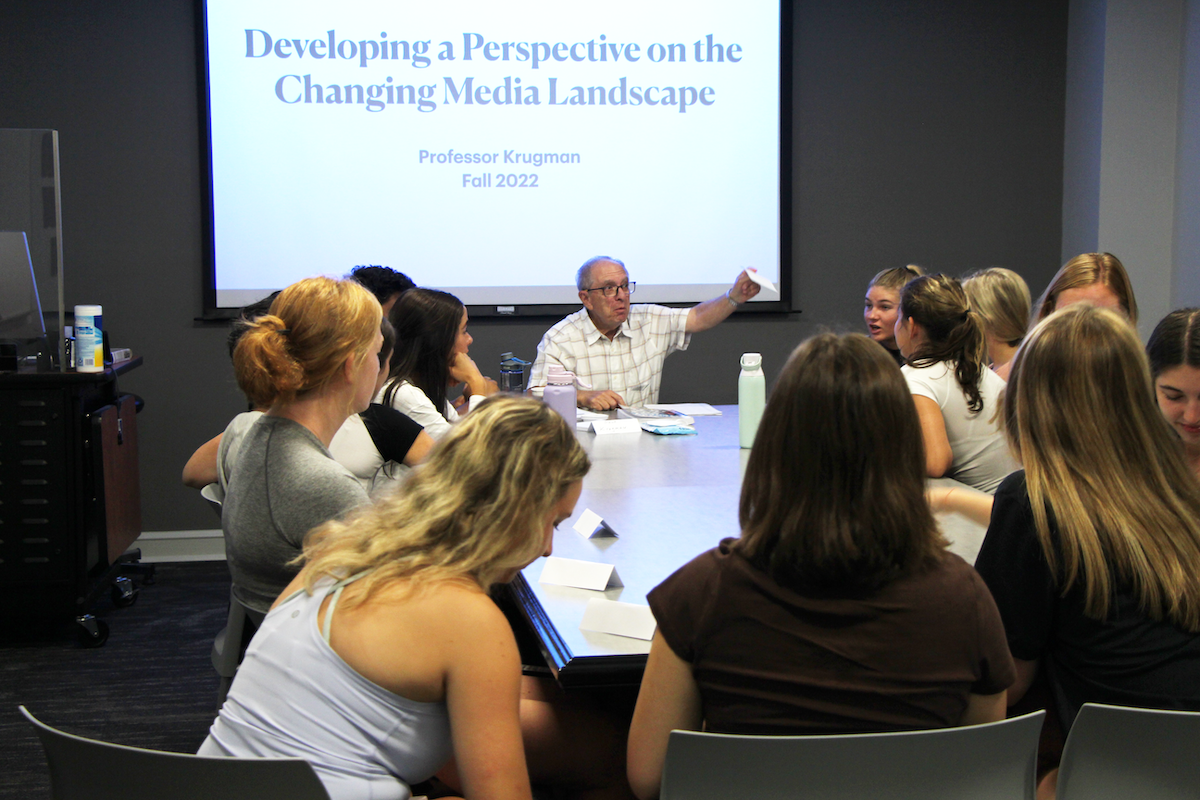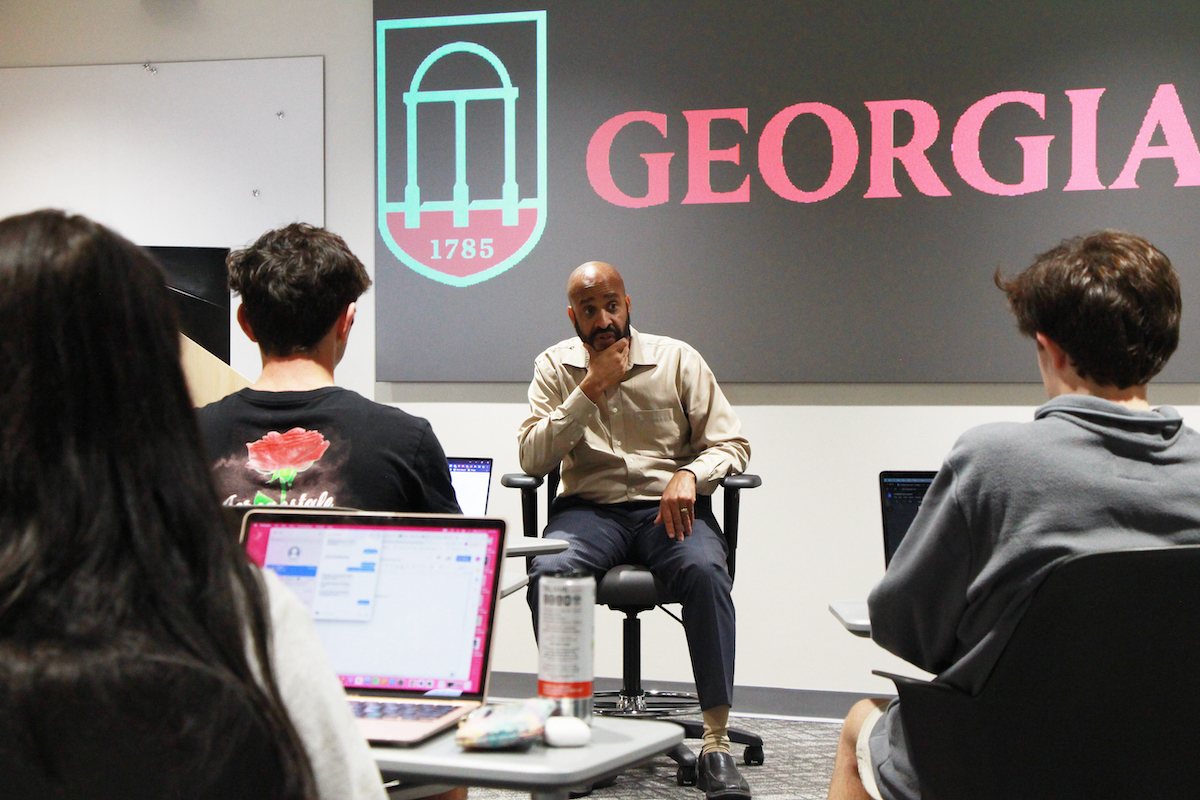Grady professors explore niche topics through first-year odyssey seminars

Grady professors explore niche topics through first-year odyssey seminars
Eleven Grady College professors are teaching first-year odyssey seminars this semester. The goal of these seminars are to provide first-year students with the opportunity to engage with faculty members and other first-year students in a small classroom setting.
Professors chose a topic of their interest and craft a course tailored to first-year students. Courses span across all departments, and topics this fall range from telenovelas to film festivals to fake news.
Dean Krugman, Booker T. Mattison and Ivanka Pjesivac share their experience teaching first-year seminars this fall.
Developing a Perspective on the Changing Media Landscape
Dean Krugman is a professor emeritus in the Department of Advertising and Public Relations. Prior to his official retirement in 2011, he taught courses in advertising management and advertising and society to undergraduates, as well as a graduate course in advertising management and communication theory.

Krugman held positions including department head and senior associate dean, “but nothing was as rewarding as teaching and doing research,” he said.
This year, he has returned to Grady College to teach a first-year odyssey seminar in changing media.
“This presented a great opportunity to come back and get in touch with students. It’s been really, really enjoyable,” he said.
His course on changing media is designed for students to understand how they consume media.
“The idea is for the students to build an intelligent and critical perspective of the media they’re using,” Krugman said.
Krugman says the classroom has always energized him, but that it’s been great to see how enthusiastic his students have been about sharing their views and receiving feedback. During the second week of class, students were assigned with writing a critique. Krugman said when he walked into class that day and asked if anyone wanted to share their critique, all 17 hands went up.
Krugman says the most rewarding part of teaching the course so far has been watching students grasp concepts, build on those concepts, and use those concepts in their work.
He says the first-year odyssey program is an enriching experience for students, and he credits UGA’s central administration for holding onto and championing this program.
The Short Film – A Lens of the Human Experience
Professor Booker T. Mattison’s course on short films uses films as both a genre and as an opportunity to examine humanity.
As a working writer and director, Mattison says “it’s nice to share with students not just what they learn in the textbook, but what’s happening in real time in the industry.”
Each week, Mattison screens a different short film – four of which he directed.

Students then write a response in class.
Mattison says it’s important for students to respond in real time so that other students do not influence their opinions. He says he hopes by doing it this way, discussions in his course are unvarnished.
For the final assignment, Mattison’s students will choose one of the films they’ve reviewed this semester and write an analysis.
He hopes the main takeaway for students in this course is that they will be able to look at visual media more critically, see themselves in visual media, and use that knowledge to better interact with others.
“The unique thing about film is that 100% of students on this campus watch movies,” he says. “The opportunity to then talk to a filmmaker and ask questions is pretty unique.”
Fake News, Misinformation and Propaganda: How to Deal with Information Disorder
Dr. Ivanka Pjesivac’s course covers topics of misinformation, disinformation and propaganda in the digital world. Pjesivac’s course begins with an explanation of misinformation, and then delves into a historical perspective of misinformation.
Pjesivac says it’s important to teach this to first-year students, who are more vulnerable to misinformation.
“I think it’s important for young people to get digital media literacy skills as soon as they can,” she says. “It’s especially important for first-year students to be familiarized with some of the characteristics of misinformation, and how to distinguish true information from false information.”
She says it’s important to expose first-year students to the research potential at UGA. In addition to lectures, she takes her students to the special collections library to view first-hand propaganda material, and takes the class to visit some of the research labs in Grady.
Pjesivac says it’s exciting to see an interest in news and misinformation among her students, many of whom are not pre-journalism or pre-Grady students.
“I see that there is a general interest among a variety of young people to learn about our current digital media ecosystem and how to navigate it,” she says.
By the end of the course, she hopes her students will have the tools to identify suspicious information and justify their skepticism.
Pjesivac says the most rewarding part of teaching this seminar is being able to apply her research to a class setting, and to expand the knowledge at Grady College to other majors.
Editor’s Note: Comments trimmed for length and clarity.